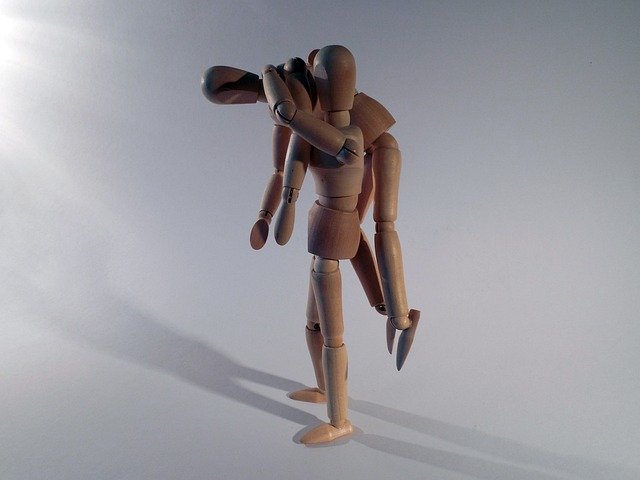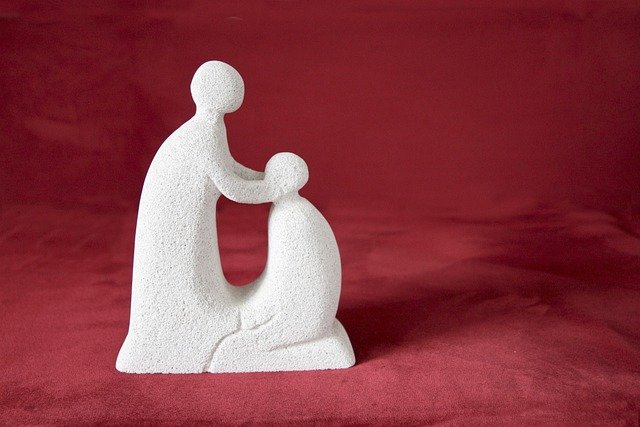
(Fotografía cortesía Pixabay.com)
Creo que una de las virtudes más hermosas del ser humano es su deseo natural de ayudar a quienes lo rodean. Lo hacemos porque sentimos que es lo que nos gustaría que hicieran con nosotros, y nos sentimos muy bien cuando recibimos la ayuda apropiada al tiempo debido. Con este escrito me uno a la iniciativa de @holos-lotus titulada: “esa pelota no es mía”.
¿Cuántos de nosotros no agradecemos que un buen amigo nos haya escuchado, ayudado y acompañado en tiempos difíciles? Por eso muchos de nosotros nos esforzamos por ser ese amigo para otros.
Nunca deberíamos perder esa esencia humana de ayudarnos mutuamente. Sin embargo, hay situaciones en las que deseamos hacer mucho más de lo que nuestras posibilidades nos permiten.
Al proceder de esta manera, generalmente terminamos sintiéndonos frustrados y decepcionados, incluso con nosotros mismos, por permitirnos habernos sacrificado tanto. Ese sentimiento es aplastante y deja una sensación de que hicimos algo mal, que debimos hacerlo mejor. Y es muy difícil librarnos de este tipo de pensamientos.
Por ejemplo, desde mi experiencia personal, hablaré de una ocasión en la que quise con todas mis fuerzas ayudar a alguien con depresión y ansiedad. Si conocen a alguien así, seguramente comprenden lo que digo. Quienes sufren de depresión o ansiedad, últimamente se ve mucho en adolescentes, muestran señales claras de que necesitan ayuda, y muchas veces es urgente que tengan a alguien en quien apoyarse.
Para quienes somos empáticos esto despierta un nivel de alarma en nosotros. Y entonces estamos pendientes de esa persona todo lo que podemos, adoptando el papel de madre, por ejemplo: ¿Comiste? ¿Dormiste bien? ¿Cómo te sientes con eso? ¿Hay algo que quieres que haga para ayudarte?
Volviendo a mi caso, yo no tenía ningún conocimiento de psicología, pero realmente intenté ayudar. ¿Cómo terminó todo? Lo bueno fue que pude adquirir mucho conocimiento sobre psicología y comportamiento humano. Lo malo fue que lo adquirí porque yo misma empecé a sentir ansiedad y depresión.
Llegado a este punto, comprendí que el deseo de ayudar a otros no puede superar la razón y el bienestar propio. No necesitamos perdernos a nosotros mismos para comprender que nunca encontraremos a la otra persona, ya que esta es una tarea que ellos tienen que hacer por si mismos. Siendo sincera, hay personas que claramente ni siquiera quieren mejorar su situación, y allí estamos nosotros desgastándonos física y mentalmente.
Con esto no estoy diciendo que tenemos que dejar de ayudar a otros, como dije anteriormente, nunca deberíamos perder esas cualidades tan bonitas como lo son la empatía y la compasión. Pero al hacerlo debemos asegurarnos que eso no afectará nuestro propio bienestar.
¿Cómo identificamos si nos estamos involucrando demasiado, y al mismo tiempo nos estamos dañando a nosotros mismos?
Podemos hacernos el siguiente cuestionario:
- ¿Al hacer esto, pierdo mi paz?
- ¿Siento que mis esfuerzos no son valorados?
- ¿Pienso más en cómo está la otra persona que en cómo estoy yo?
- ¿Hago sacrificios que no me están pidiendo, y que posiblemente no agradecerán?
- ¿Qué puedo hacer y que no debo hacer?
- ¿Es hora de retroceder?
Recordemos que para ayudar a otros tenemos que estar sanos nosotros, así podremos tener cosas buenas que ofrecer. Luego de ese análisis personal, puedo decidir si esa pelota – situación, problema o preocupación – es mía o no.

(Fotografía cortesía Pixabay.com)

English

(Fotografía cortesía Pixabay.com)
I believe that one of the most beautiful virtues of human beings is their natural desire to help those around them. We do it because we feel that it is what we would like them to do with us, and we feel great when we receive the appropriate help in a timely manner. With this writing I join @holos-lotus's initiative entitled: "that ball is not mine".
How many of us are not grateful that a good friend has listened to us, helped us and accompanied us in difficult times? That's why many of us strive to be that friend to others.
We should never lose that human essence of helping each other. However, there are situations in which we want to do much more than our possibilities allow us to do.
By proceeding in this way, we usually end up feeling frustrated and disappointed, even with ourselves, for allowing ourselves to have sacrificed so much. That feeling is overwhelming and leaves a sense that we did something wrong, that we should have done better. And it is very difficult to get rid of these kinds of thoughts.
For example, from my personal experience, I will talk about an occasion when I wanted so badly to help someone with depression and anxiety. If you know someone like this, you surely understand what I am saying. Those who suffer from depression or anxiety, lately seen a lot in teenagers, show clear signs that they need help, and it is often urgent that they have someone to lean on.
For those of us who are empathic, this awakens a level of alarm in us. And then we are on the lookout for that person as much as we can, adopting the role of a mother, for example: Did you eat? Did you sleep well? How do you feel about that? Is there anything you want me to do to help you?
Going back to my case, I didn't have any knowledge of psychology, but I really tried to help. How did it all end? The good thing was that I was able to acquire a lot of knowledge about psychology and human behavior. The bad thing was that I acquired it because I myself started to feel anxiety and depression.
At this point, I understood that the desire to help others cannot overcome reason and one's own well-being. We do not need to lose ourselves to understand that we will never find the other person, as this is a task they have to do for themselves. To be honest, there are people who clearly don't even want to improve their situation, and there we are wearing ourselves out physically and mentally.
With this I am not saying that we have to stop helping others, as I said before, we should never lose those beautiful qualities such as empathy and compassion. But in doing so we must make sure that it will not affect our own well-being.
How do we identify if we are getting too involved, and at the same time harming ourselves?
We can ask ourselves the following questionnaire:
- By doing this, do I lose my peace?
- Do I feel that my efforts are not valued?
- Do I think more about how the other person is doing than how I am doing?
- Do I make sacrifices that are not being asked of me, and that they may not appreciate?
- What can I do and what shouldn't I do?
- Is it time to back off?
Let's remember that to help others we have to be healthy ourselves, so we can have good things to offer. After that personal analysis, I can decide if that ball - situation, problem or concern - is mine or not.

(Fotografía cortesía Pixabay.com)


Traducido al inglés con deepl.com
Posted Using InLeo Alpha

